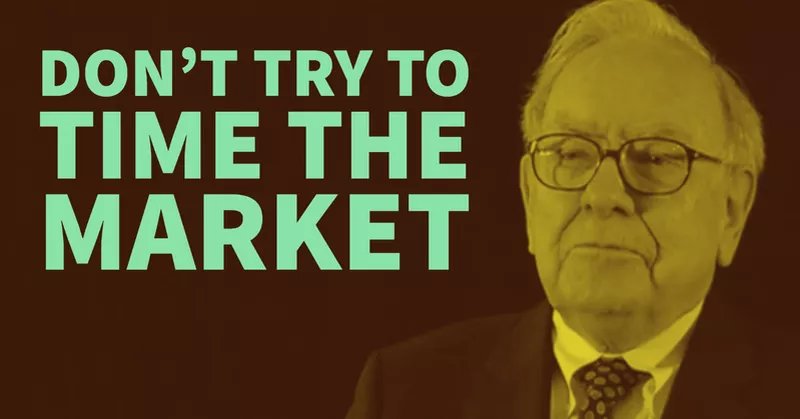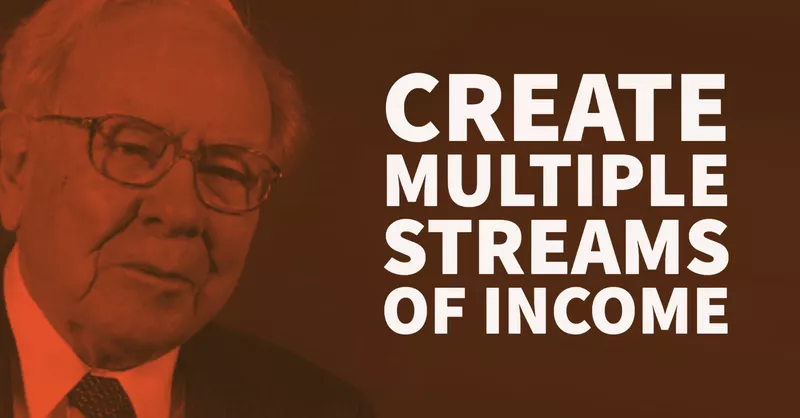Warren Buffett’s Best Money Advice
The Oracle of Omaha is among the top five wealthiest in the world. So what can the Average Jane or Joe learn from him? Plenty, it turns out.
Buffett’s practical wisdom is as much for the minimum wage earner as it is for the C-level executive earning a six-figure salary. In fact, you might be surprised at just how simple his practical and timeless money advice is.
Today we’re sharing 15 pieces of investing advice that Buffett has given over the years, along with how to apply it to your life.
Borrow Wisely, If At All

Good debt, bad debt…it doesn’t matter. Any of it can get you into trouble if you have too much of it, Buffett notes:
I’ve seen more people fail because of liquor and leverage—leverage being borrowed money. You really don’t need leverage in this world much. If you’re smart, you’re going to make a lot of money without borrowing. — Warren Buffett, 1991 Lectures at Notre Dame
Warren’s Tip:
When you must borrow, do so sensibly so that you are making traction towards your future goals. “Good debt” gets you into a better place over the long term and includes things like a college degree or investing in tools to start your own business. On the other hand, “bad debt” is that which has no positive impact on your life, like credit cards maxed out from too much unnecessary spending or a payday loan.
Do your best to minimize and eliminate good debt while staying as far away as you can from bad debt.
Save from the Top

You only have enough money to invest when you prioritize saving, and the best way to do that is to take it from your paycheck before anything else. Buffett advises,
“Don’t save what is left after spending; spend what is left after saving.” — Warren Buffett
Warren’s Tip:
When you save the amount you have left over after regular bills and debt, you won’t have as much, if any, left over. It’s too easy to say to yourself, “I’ll start next month.”
Think it’s impossible to pay all the bills after taking a percentage and putting it towards savings? Then try these two things: determine to start with saving just 1 percent of your income and make a thorough budget that accounts for every cent you take in and spend. Make a goal to increase your savings amount by another percent each month until you’re effortlessly saving the percentage that you desire.
Develop Good Financial Habits

Most parents go through great lengths to instill good habits in their kids: don’t talk with food in your mouth, say “please and thank you,” keep a neat appearance. Manners and cleanliness are essential, but so is having enough money. Few people think about their financial mindset and why they save (or don’t) accordingly. Buffet wisely says,
“Chains of habit are too light to be felt until they are too heavy to be broken…you can have any habits, any patterns of behavior that you wish. It’s a matter of what you decide.” — Warren Buffett, lecture at University of Florida School of Business
Warren’s Tip:
We don’t notice the good habits we have until we see the significant impact which they have. How is it that you’re able to contribute $150 each week to your retirement plan when your colleagues barely manage to scrape by? It’s then, when you take a deeper look and ponder this, that you see this comes from all the tiny habits you’ve developed: buying classic, yet quality, styles of clothes; drinking only water; brown bagging your lunch most days; driving a well-maintained ten year old vehicle.
Don’t have many good financial habits yet? Start with saving from the top. Cut out your coffee breaks and put the $25 you save towards a debt. Resolve to only borrow books from the library rather than feed your Amazon habit.
End the Paycheck-to-Paycheck Lifestyle

Once you’re living paycheck-to-paycheck it seems impossible to break free. And many never do. But it is possible and well worth the energy and effort. But that’s what it takes, Buffet notes,
“Should you find yourself in a chronically leaking boat, energy devoted to changing vessels is likely to be more productive than energy devoted to patching leaks.” — Warren Buffett
Warren’s Tip:
In personal finance terms, this means it’s a better use of your time to create and follow a budget that keeps your money going to the right places (housing, food, clothing) rather than just being spent without much thought (nights out with friends, more toys for the kids). Sure, you could get a payday loan or take from your 401k, but these do nothing to solve the root cause: living on more than what you earn.
It’s is a whole lot easier to go into the cash advance shop to get $500 to tide you over for two weeks, but over the long term, selling your $15,000 car and trading in the payment for a paid-for $5,000 car will be beneficial each and every month going forward.
Keep Your Investing Simple…

While some financial planners would like you to believe otherwise, investing does not need to be difficult. No need for multiple meetings with advisors who will help you put your money in the next “hot stock.” No need to have a complex portfolio spread amongst multiple investment companies.
“When trillions of dollars are managed by Wall Streeters charging high fees, it will usually be the managers who reap outsized profits, not the clients. Both large and small investors should stick with low-cost index funds…My regular recommendation has been a low-cost S&P 500 index fund.” — Warren Buffett, 2016 Berkshire Hathaway Shareholder Letter
If this advice is good enough for one of the world’s wealthiest people, it’s good enough for everyone.
Warren’s Tip:
For those who’ve never invested on their own, here’s how to start in just five easy steps:
1. Spend no more than a couple of hours, researching reputable investing companies that you’re familiar with.
2. Create an account online.
3. Choose an index fund which invests in the top 500 companies and has low fees.
4. Transfer money to your investment account.
5. Repeat monthly for best results.
Invest for the Long-Haul

Investing is for the long-haul. It’s not something you decide to do today, continue for a few years and then decide to stop doing because your investment hasn’t grown as much as you’d like. Buffett advises looking at the big picture when he says,
“If you aren’t willing to own a stock for ten years, don’t even think about owning it for ten minutes. Put together a portfolio of companies whose aggregate earnings march upward over the years, and so also will the portfolio’s market value.” — Warren Buffett
Warren’s Tip:
It’s best to take a hands-off, set-it-and-forget-it sort of approach. Once you do your research and choose a few funds to invest in, then just do it. Don’t stress over the minor ups and downs that occur day-to-day. Nor the larger ones that happen every few years.
The only time you lose money in the stock market is when you take your money out while the market’s down. Given enough time, it’s a pretty safe bet that it will go back up.
Don’t Blindly Follow Investing Advice

Chances are you’ve had at least one colleague, friend or relative give you a “secret stock tip” that they got from a buddy. While it might be legit and pay off big if it’s the next Apple or Facebook, it also might set you back financially. Take what you hear and read with a grain of salt.
“We’ve long felt that the only value of stock forecasters is to make fortune-tellers look good…I continue to believe that short-term market forecasts are poison and should be kept locked up in a safe place, away from children and also from grown-ups who behave in the market like children.” — Warren Buffett, 1992 Berkshire Hathaway Chairman’s Letter
Warren’s Tip:
When people are in a frenzy over buying something because its price is skyrocketing, it’s time to sit back and think about how this may end up. Talk to some friends who you know are well-off financially to get their take on it; then ask others. Use that information to make an educated decision. But don’t rush into something just because someone told you to.
Don’t Try To Time the Market

Throughout its history, the stock market has had cycles of good times and bad. So far, it’s always come back and then some. While there’s no crystal ball to consult, history gives us a pretty good indicator that downs will be followed by record highs after some time.
“And if they insist on trying to time their participation in equities, they should try to be fearful when others are greedy and greedy only when others are fearful.” — Warren Buffett, 2004 Berkshire Hathaway Chairman’s Letter
Warren’s Tip:
Market timing is like gambling; you never know when you’re better off staying where you are or continuing on. As the market goes higher, be wary of joining in by buying more. Rather, wait until the market drops and buy up as much as you can.
Just Get Started

Trees, like wealth, don’t grow overnight. In fact Buffet has earned the majority of his wealth in the last 30 of his 86 years of life. Not taking action costs you in the long-term.
“Someone is sitting in the shade today because someone planted a tree a long time ago.”— Warren Buffett
Warren’s Tip:
Not taking the first steps to starting investing, paying off debt or saving is where many fail. There are too many choices. Too much jargon. Not enough time. Not enough money. Excuses, excuses.
Effort is better spent just making time to learn the essentials and get started. Sure, you might make a mistake, but resolve to remedy that if and when it happens. Whether or not you eat steak and wine or cold cuts and grape soda at retirement depends on the actions you take now.
Share the Wealth

Warren Buffett and his pals, Bill and Melinda Gates are famous for spearheading a movement for billionaires to pledge to give away the majority of their wealth and not leave it to their heirs. This is a fabulous example they’ve set for the rest of the world. About his decision, he says,
“Were we to use more than 1% of my claim checks on ourselves, neither our happiness nor our well-being would be enhanced. In contrast, that remaining 99% can have a huge effect on the health and welfare of others.” — Warren Buffett via The Giving Pledge
And he urges others to join him:
“If you’re in the luckiest one per cent of humanity, you owe it to the rest of humanity to think about the other 99 per cent.”
Warren’s Tip:
Even if you’re not in the 1%, it’s important to remember how fortunate you are. Just reading this alone means that you’ve got access to technology that some have never even heard of, and even more importantly, you can read.
Giving can take many forms: a local charity, a national cause you support, your house of worship, a family down the block that you know is struggling. If you’re deep in debt and working yourself out, giving can mean driving a coworker home at the end of your shift; babysitting your friend’s kids for free; taking a meal to a neighbor who’s ill.
Head Towards the Markdowns

Throughout its history, the stock market has had cycles of good times and bad. So far, it’s always come back and then some. While there’s no crystal ball to consult, history gives us a pretty good indicator that downs will be followed by record highs after some time.
“And if they insist on trying to time their participation in equities, they should try to be fearful when others are greedy and greedy only when others are fearful.” — Warren Buffett, 2004 Berkshire Hathaway Chairman’s Letter
Warren’s Tip:
Whether you pay $499 or $199 you’re still getting the same exact bedding set. Same with the steaks and investment. In a year, the price of the investment may be $100 a share, but if you bought it at $30 a share than you got a better deal than the person who bought it at $50 a share.
This advice works in all aspects of life. Do you want to treat yourself to a dinner out? Look for a coupon first. Will your kids only eat a certain brand of cereal? Then buy multiple boxes the next time it’s on sale.
Avoid Leverage

In today’s no-money down, “it takes just 3 minutes to apply for our store credit card,” take-24-months-to-pay-world, leverage is overused by many. Leverage is using other people’s money to get what you want and can’t obtain without the use of other people’s’ money.
And while it’s not illegal to borrow, you do sleep better knowing you don’t owe anybody anything, as Buffet notes in his 2008 letter to his shareholders,
“I have pledged – to you, the rating agencies and myself – to always run Berkshire with more than ample cash. We never want to count on the kindness of strangers in order to meet tomorrow’s obligations. When forced to choose, I will not trade even a night’s sleep for the chance of extra profits.” — Warren Buffett
Warren’s Tip:
There’s a certain level of stress, which varies by person, that comes with owing money or being on the verge of not having enough.
Combat this by having an emergency fund, safely tucked away in a savings account, that’s equal to three to six months of living expenses. Calculate what your bare-bones budget would be for a month and then multiply that by three or six. The less stable your job situation, the more you should have.
This money should only be touched for true emergencies: your spouse falls, breaks a bone and is off work for six weeks; the car needs a new battery; your refrigerator suddenly breaks. Emergencies are not: a new sound system for your vehicle; new clothing that’s 50% off; Christmas gifts. These three things can, and should, be planned for and saved up for accordingly.
Create Multiple Streams of Income

Many single people live fine on their income but then start to have trouble when they combine finances with their partner. Then when life happens in the form of a lay off or baby or moving to a new town for one partner’s job without one lined up for the other. In these circumstances, it’s not usual for financial troubles to occur with even the most dedicated budgeters. Warren advises that people,
“Never depend on a single income. Make investment to create a second source.” — Warren Buffett
Warren’s Tip:
Life is too volatile and nothing is guaranteed. Besides investing for the long term via 401k and Roth IRAs, you need to have money accessible at a moment’s notice. Ideally this will be in an emergency fund, but you can also earmark an index fund for living expenses should you ever need more than your emergency fund. Also, make it a goal to live on less than your combined incomes, if you’re in a relationship, or your total income. In some parts of the world it’s common to live off of just one partner’s income and save the entire other on for the future.
You Don’t Have To Be An A-Student To Succeed At Investing

You probably haven’t thought much about your grades since you left school, and that’s okay. Your report card doesn’t matter in the real world, but your desire to succeed and discipline do, as Buffet notes,
“We don’t have to be smarter than the rest; we have to be more disciplined than the rest.” — Warren Buffett
Warren’s Tip:
It takes just hours to get a good understanding of how index funds work compared to single stocks. Add in another hour to choose funds that have at least a five year track record that gives a good rate of return, and you’re good to go. If you can give up the latest reality shows for a week, you can set yourself up for success. Don’t stop there, though. Discipline means that you’re investing each and every month or pay period. Year in and year out. Want to upgrade your vehicle? That’s fine, just don’t use the money you budget for your investing goals. When you see the fruits of your not-so-laborious-labor, you’ll be glad you did!
Work With People Who Have High Levels of Integrity

Whether you need a financial planner to help you decide what to do with an inheritance or you’re starting up a business and need to hire an employee, heed this advice from Buffett,
“Somebody once said that in looking for people to hire, you look for three qualities: integrity, intelligence, and energy. And if you don’t have the first, the other two will kill you. You think about it; it’s true. If you hire somebody without [integrity], you really want them to be dumb and lazy.” — Warren Buffett
Warren’s Tip:
Although the quotation refers to hiring, the same three things can easily apply to any people you choose to hang around. Need to sell your house? You want a realtor who will put your needs before her own. Want a house sitter while you’re away? Someone without integrity will make you sad that you ever left.
Additional Warren Buffett Quotes

Warren Buffett is known for his pointed quotes about investing, business, and life in general. Flickr
On Becoming a Successful Investor:
“You only have to do a very few things right in your life so long as you don’t do too many things wrong.”
“It is not necessary to do extraordinary things to get extraordinary results.”
“I don’t look to jump over seven-foot bars; I look around for one-foot bars that I can step over.”
On The Long View
“What we learn from history is that people don’t learn from history.”
“In the short term, the market is a popularity contest. In the long term, the market is a weighing machine.”
On Character:
“It takes 20 years to build a reputation and five minutes to ruin it. If you think about that, you’ll do things differently.”
“It’s better to hang out with people better than you. Pick out associates whose behavior is better than yours and you’ll drift in that direction.”
On The Power of Saying No:
“The difference between successful people and really successful people is that really successful people say no to almost everything.”